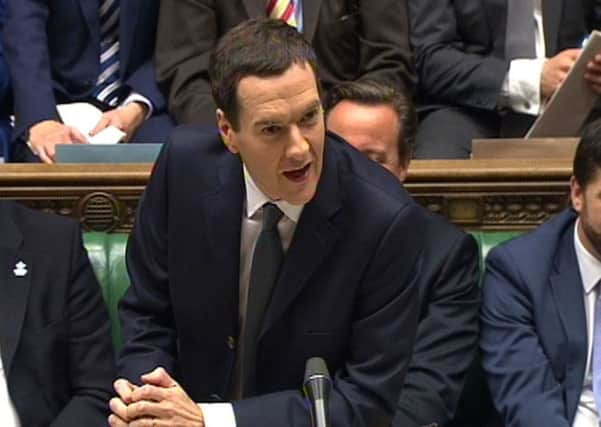Chancellor faces colossal cuts


The Chancellor said dire warnings about the impact of a fresh round of government spending cuts on public services were “nonsense”.
Mr Osborne condemned “hyperbolic” predictions about the consequences, insisting that Britain would not descend into a George Orwell-style dystopia.
Advertisement
Hide AdAdvertisement
Hide AdPainting the poll in May as a choice between his “course to prosperity” or a return to Labour “chaos”, he blamed economic “storms” for the Coalition’s failure to clear the deficit on schedule.
And he went on the attack in a tetchy interview with John Humphrys on the BBC Radio 4 Today programme, complaining that the corporation’s coverage was like “listening to a rewind of 2010”.
“You had BBC correspondents saying Britain is returning to a George Orwell world of the Road To Wigan Pier,” he said. “It is just such nonsense.
“I thought the BBC would have learnt over the past four years that its totally hyperbolic coverage of spending cuts has not been matched by what has actually happened.”
Advertisement
Hide AdAdvertisement
Hide AdHe went on: “What I reject is the totally hyperbolic BBC coverage of spending reductions. I had all that when you were interviewing me four years ago and has the world fallen in? No, it hasn’t.
“Government departments are going to have to make savings. On the welfare bill we are going to have to do things like freeze working-age benefits.
“I’m not pretending these are easy decisions or that they have no impact.
“But the alternative of a return to economic chaos, of not getting on top of your debts, of people looking at Britain across the world and thinking that is not a country in charge of its own destiny, is not a world that I want to deliver.”
Advertisement
Hide AdAdvertisement
Hide AdThe realities of the Chancellor’s plans were reinforced by the Institute for Fiscal Studies, which said the Autumn Statement will mean cuts “on a colossal scale”.
Despite ministers’ indications that the bulk of the UK’s fiscal consolidation following the financial crisis of 2008 has been completed, the economic thinktank said that just £35bn of the cuts in spending by Whitehall departments have already happened, with £55bn yet to come.
If reductions in departmental spending were to continue at the same pace as they have over the past four years, welfare cuts or tax rises worth about £21bn a year would be needed by 2019/20 - at a time when Conservatives are committed to income tax cuts worth £7bn - said IFS director Paul Johnson.
In a post-statement briefing in London, Mr Johnson said that the precise nature of planned cuts to services like local government, defence and transport had not yet been spelt out, and stressed that it would be wrong to describe them as “unachievable”.
Advertisement
Hide AdAdvertisement
Hide AdBut he said voters would be justified in asking whether the Chancellor was planning “a fundamental reimagining of the role of the state”.
And he added: “If we move in anything like this direction, whilst continuing to protect health and pensions, the role and shape of the state will change beyond recognition.”
A BBC spokeswoman defended the Autumn Statement coverage, saying: “We’re satisfied our coverage has been fair and balanced and we’ll continue to ask ministers the questions our audience want answered.”